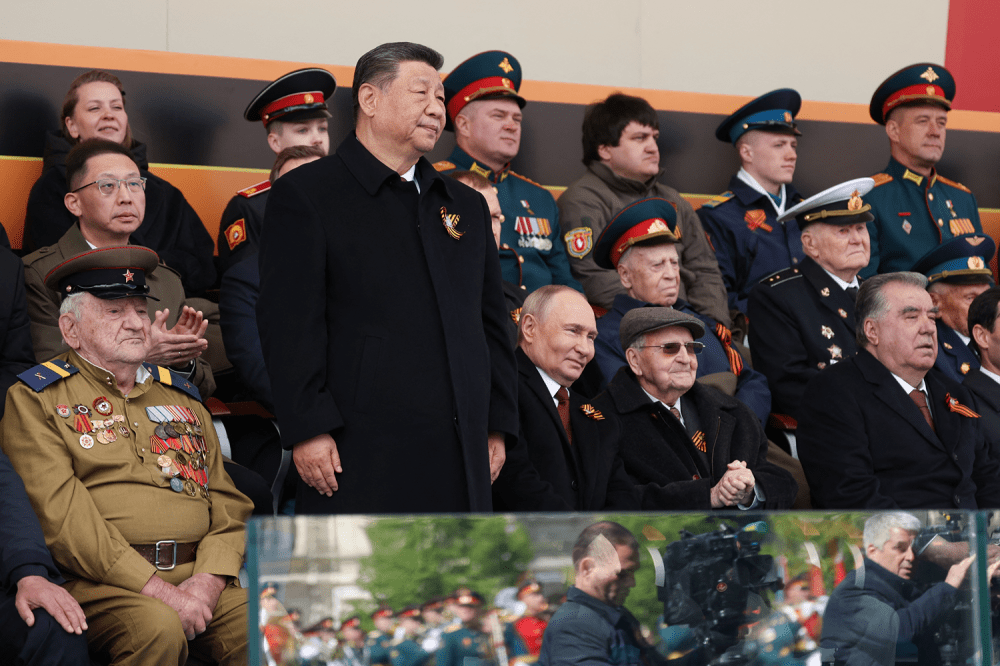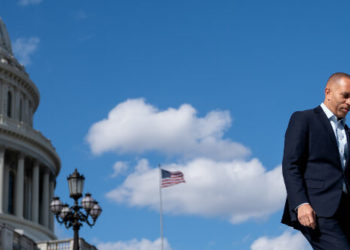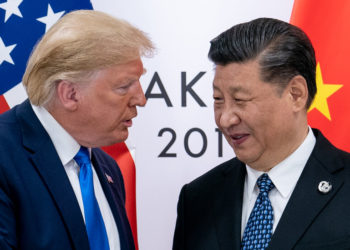Imagine this: U.S. President Donald Trump and Russian President Vladimir Putin stand on either side of Chinese President Xi Jinping atop Beijing’s Tiananmen Tower, watching a Chinese military parade. What would that image evoke? Certainly a political storm and a wave of harsh criticism from Western media directed at Trump. But it might also be a rare chance for diplomacy.
Sept. 3 marks the 80th anniversary of China’s victory over Japan, following its surrender to the Allies on Sept. 2, 1945, and the global triumph over fascism. The Chinese government has already announced a series of commemorative events, including a military parade. Japan’s Kyodo News has claimed that China may invite Trump to attend the ceremony—which China has denied.
This may be just a wild rumor. But given the current state of U.S.-China relations and the evolving world order, getting both leaders in a room isn’t a bad idea. If I were the Chinese government, I would invite Trump. To shield him from domestic criticism for endorsing an authoritarian regime, the visit could be framed as a formal state visit, with the commemoration included as part of the itinerary.
But a U.S. presidential appearance at the event would have an important impact—recognizing and elevating China’s role in the global narrative of the struggle against fascism.
As historians such as Rana Mitter have noted, China’s status as the principal Eastern theater in World War II has long been downplayed or deliberately ignored in Western narratives. In their telling, China’s eight years of resistance and its tremendous sacrifices were a marginal part of the Allied victory—its contribution often rated lower than that of France, which surrendered early in the war. This narrative distorts the historical reality, in which roughly 20 million Chinese soldiers and civilians, and around 480,000 Japanese soldiers, were killed. China has long attempted to correct the Western-dominated version of World War II history but with limited success.
Trump’s attendance at the anniversary would in itself represent recognition by another major World War II victor of the importance of the Chinese theater and China’s core contribution. While the elevation of China’s wartime legacy ultimately depends on its own efforts and ability to tell wartime stories, the participation of a U.S. president would serve as a form of international acknowledgment, helping to break the Western-centric framing of the anti-fascist war.
On the geopolitical front, 2025 marks a new round of strategic probing. The Biden-era policy of “competition and engagement” has solidified into structural confrontation. While Trump’s new administration remains tough on China, his highly personal, transactional, and improvisational diplomatic style offers Beijing an opportunity to exert informal influence over the direction of U.S. policy.
However, if Trump’s visit is limited to economic talks or a conventional state visit, its symbolic value will be constrained. Anchoring the visit to the 80th anniversary commemoration, by contrast, shifts the narrative from confrontation to shared themes of peace, history, and a joint anti-fascist victory—recalling the time when China and the United States were allies against Japanese fascism.
Given Trump’s flair for bypassing institutions and staging dramatic moments, China could offer him a historic venue that he would find hard to refuse. His presence would become a form of symbolic detente in U.S.-China relations, slowing the tempo of structural conflict and potentially opening new channels for dialogue.
Of course, the image that would command the most attention if Trump attends is the one of the Chinese, Russian, and U.S. leaders standing together—a tableau that would eclipse all other diplomatic encounters. Western media would likely portray it as the emergence of a “new axis” or a Chinese-brokered rapprochement between the United States and Russia.
Rather than avoiding such interpretations, Beijing should proactively frame the narrative. The message should be that the invitation to Trump is not about forming a trilateral alliance but about demonstrating that China is capable of simultaneously engaging both Washington and Moscow and hosting them on its own diplomatic stage. Appearing alongside Putin reflects enduring historical ties; standing with Trump signals China’s contemporary influence. Beijing’s goal is not to reconstruct Cold War-style blocs but to project itself as a coordinator of peace in a multipolar world.
Such a three-way appearance would not represent a military pact or values-based coalition. Even if China had such intentions, they are not feasible. Rather, this would be a symbolic convergence, mediated by history. If China conveys this clearly, both the West and the global south might be less alarmed by the image of the three leaders together.
Nonetheless, criticisms that Trump is being used by China are inevitable. In anticipation, Beijing should frame the trip as a full-fledged state visit, with the anniversary event as only one part of the broader agenda. It should also invite other Western leaders, the U.N. secretary-general, and leaders from Asian and African countries—including Japan—to present the event as a global commemoration of peace. This would help dilute the focus on a China-U.S.-Russia triangle and bolster China’s image as a responsible and peaceful power.
Trump had previously expressed interest in visiting China. According to a recent Nikkei Asia report, U.S. officials are preparing a visit for later this year, with Trump potentially leading a delegation of dozens of CEOs. This suggests that a visit in the second half of 2025 is indeed likely. For Trump, a leader who thrives on symbolic gestures, Beijing offers both the historical gravitas and ceremonial drama he craves. Framing the visit as a state trip with participation in the anniversary commemoration would benefit not only U.S.-China relations but also broader efforts for global peace.
In the end, the real question is not whether Trump is willing to come—but whether Beijing is willing to extend the invitation.
Several factors could hinder such a visit. First, even if it is formally designated as a state visit, the real highlight—Trump’s attendance at the military parade—will be obvious. That alone would trigger fierce criticism in the West, especially in the United States, where both Democrats and establishment Republicans would accuse him of cozying up to an authoritarian regime. Whether Trump could withstand that pressure is highly uncertain—and Beijing tends to avoid high-risk scenarios.
Second, if the invitation is extended under the label of a state visit, what concrete achievements can realistically result given the current bilateral climate? If no meaningful agreements emerge, the diplomatic weight of the “state visit” label could be squandered. Yet without that label, Trump might simply decline the invitation.
Third, Beijing must weigh how the global south would react to the visual of the Chinese, Russian, and U.S. leaders sharing the stage. Even if leaders from the global south are also invited, the international spotlight will remain fixed on the superpowers. Those other invitees may be perceived as mere decoration. If Trump is granted special honors beyond what is afforded to other leaders, it could undercut Beijing’s insistence that it stands with the developing world—reinforcing suspicions that China, despite its rhetoric, prioritizes engagement with great powers. This may weaken China’s influence among global south nations.
All these factors suggest that Beijing may ultimately decide against inviting Trump. Even if it does, the immense political pressure Trump would face at home—accusations of kneeling before authoritarian China—could deter him from accepting the invitation. That would be a shame: The shared legacy of the struggle against fascism deserves better.
The post China Should Invite Trump to Its Military Parade appeared first on Foreign Policy.




